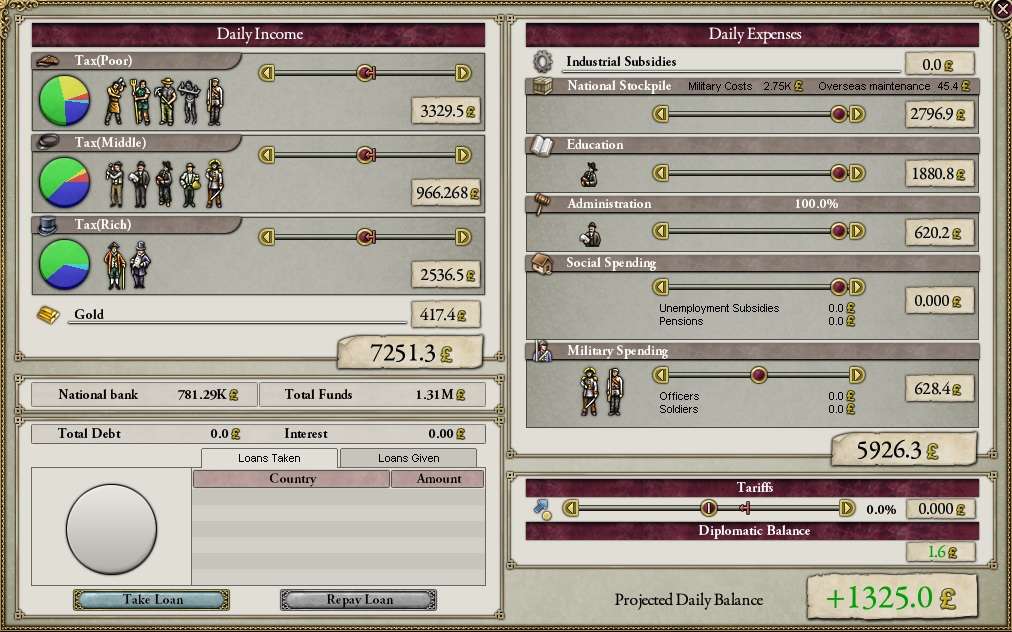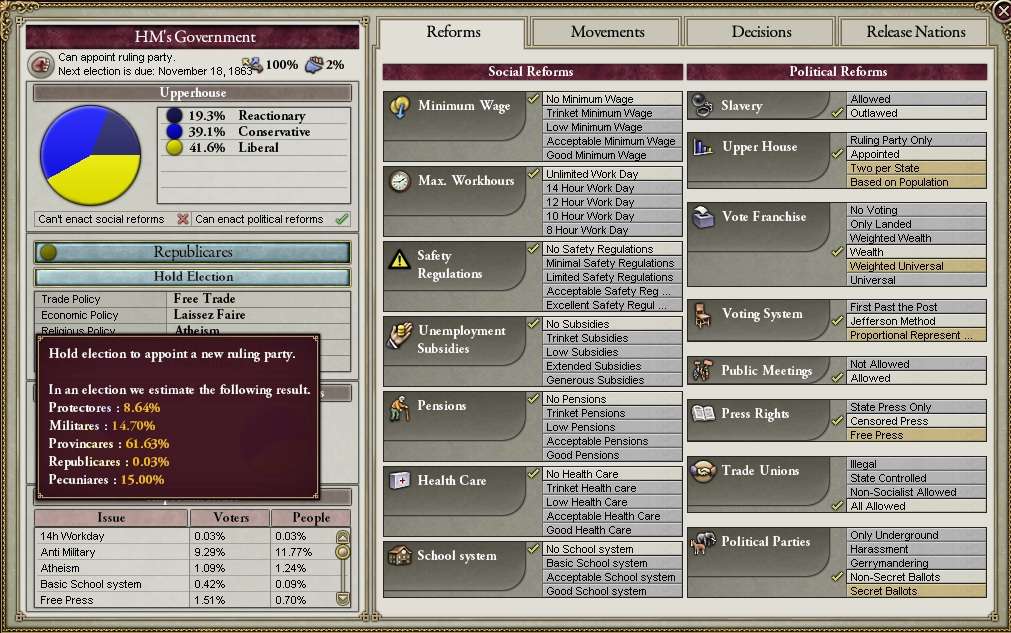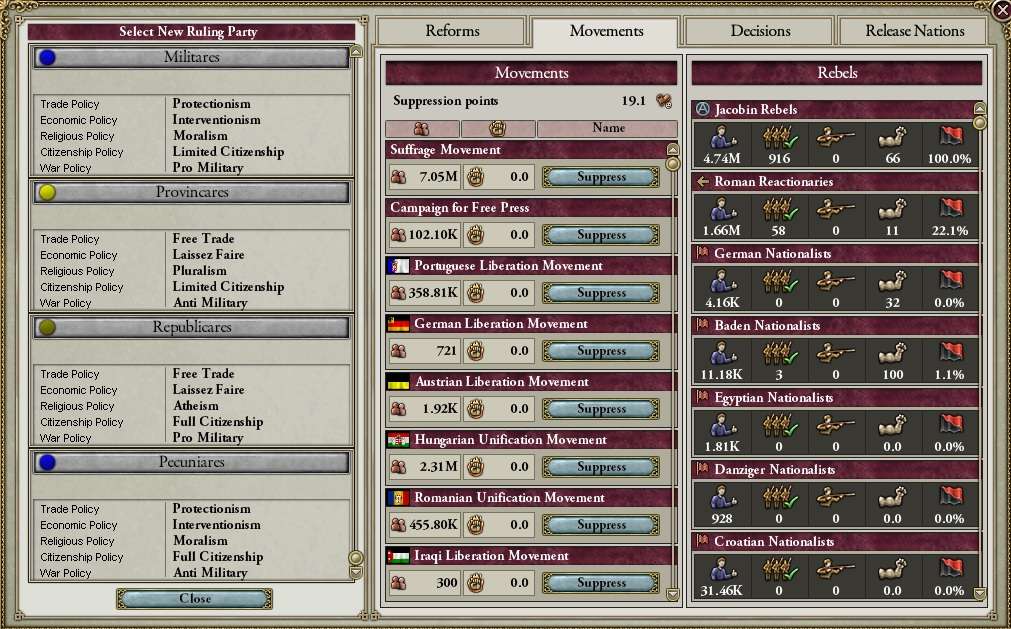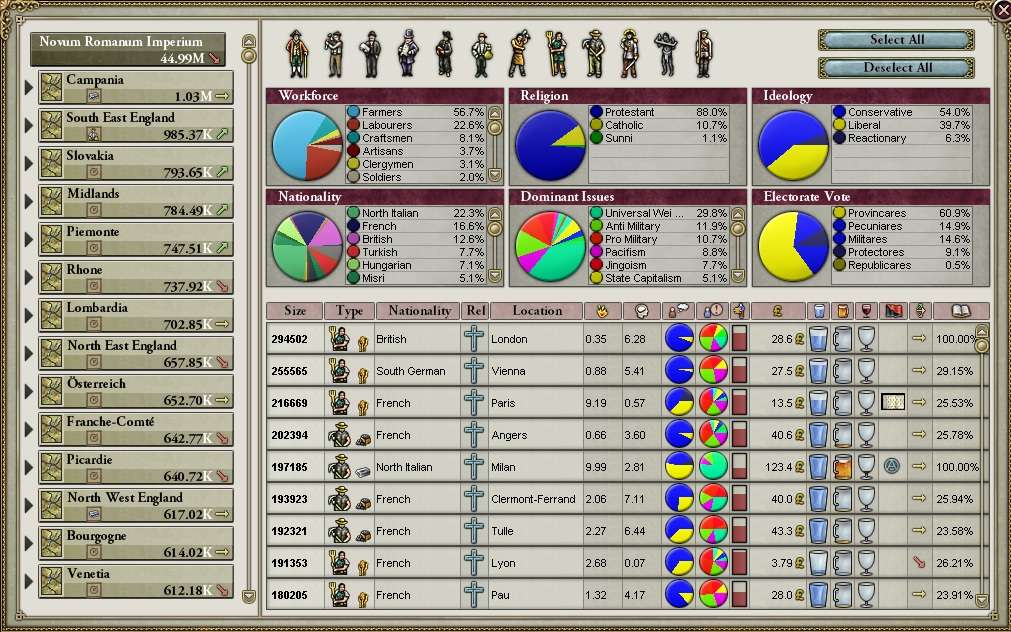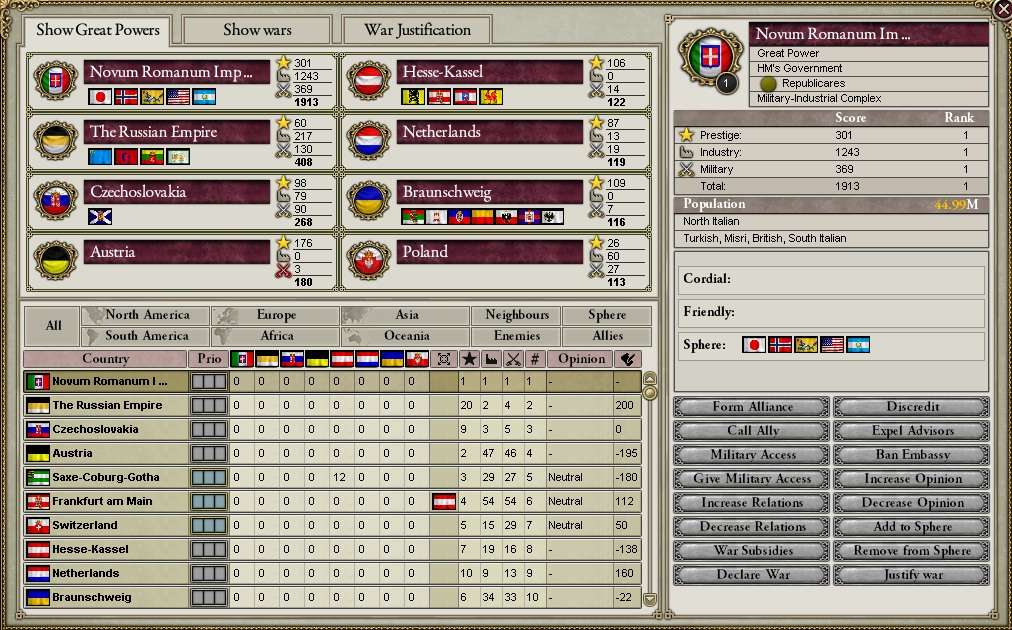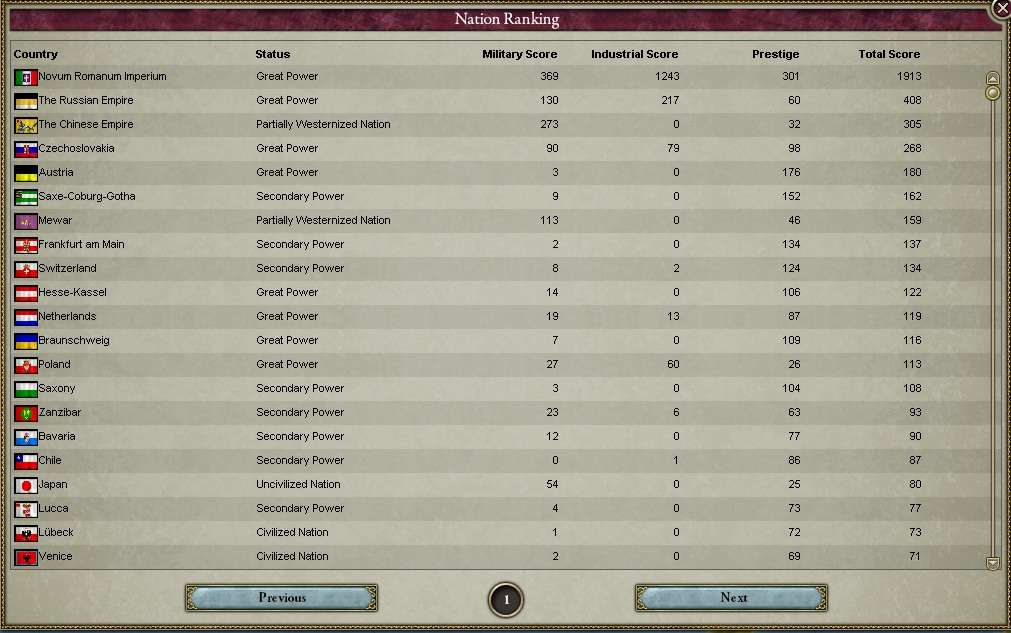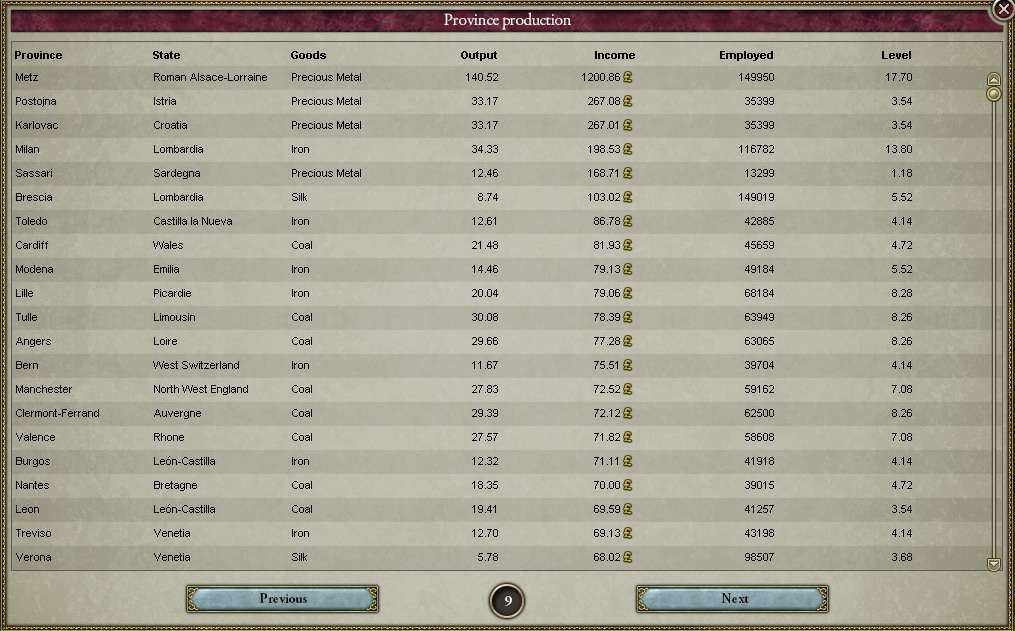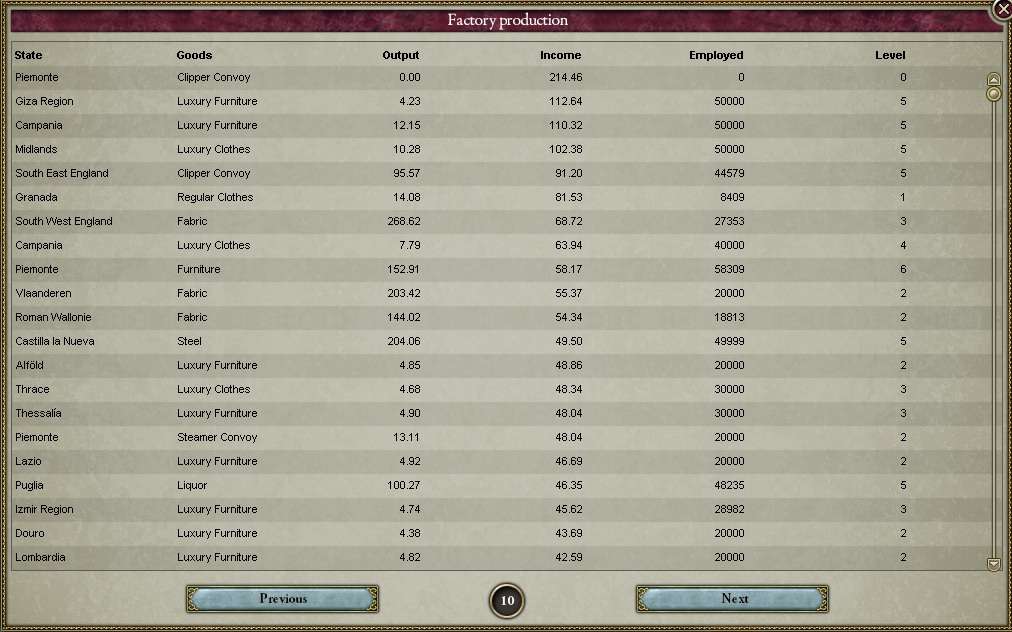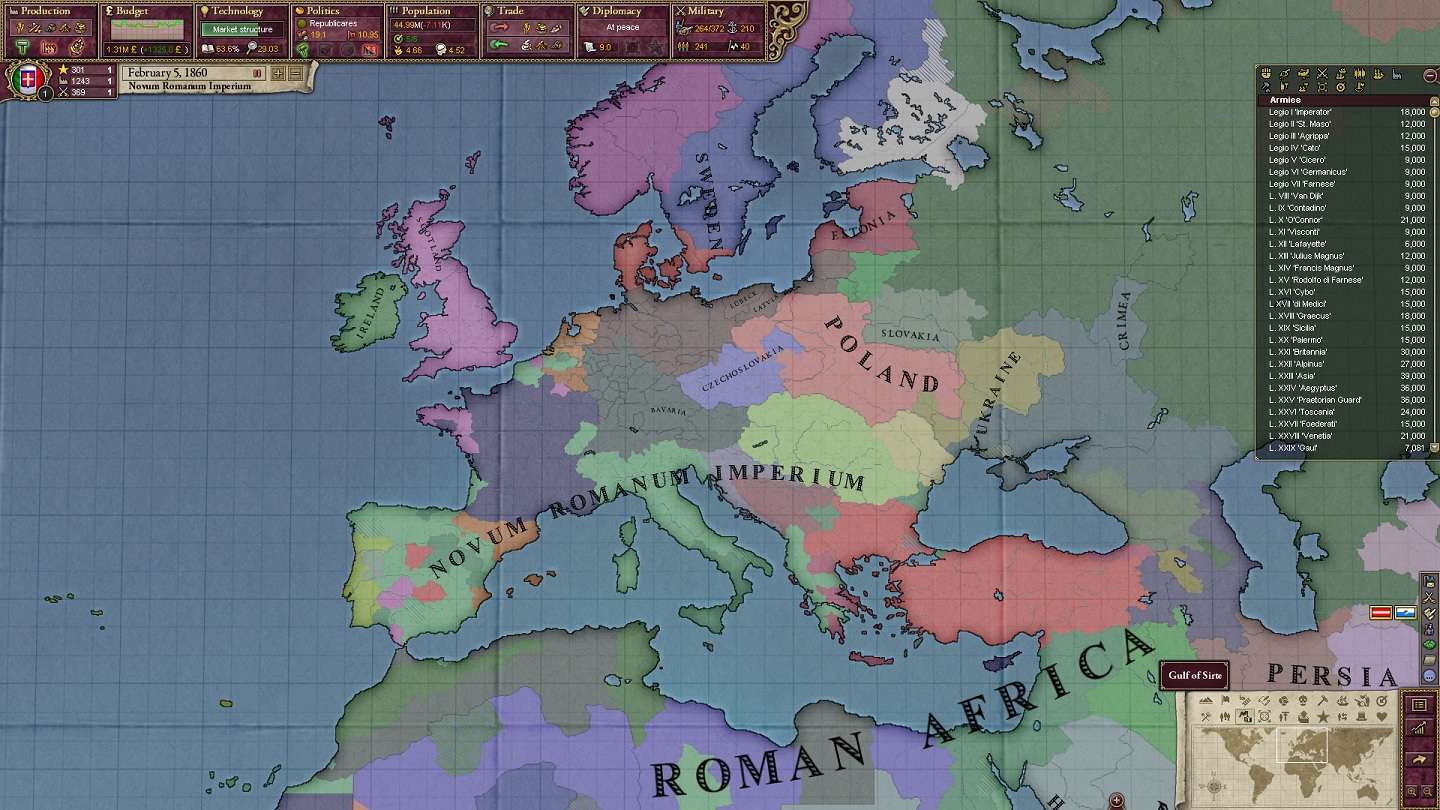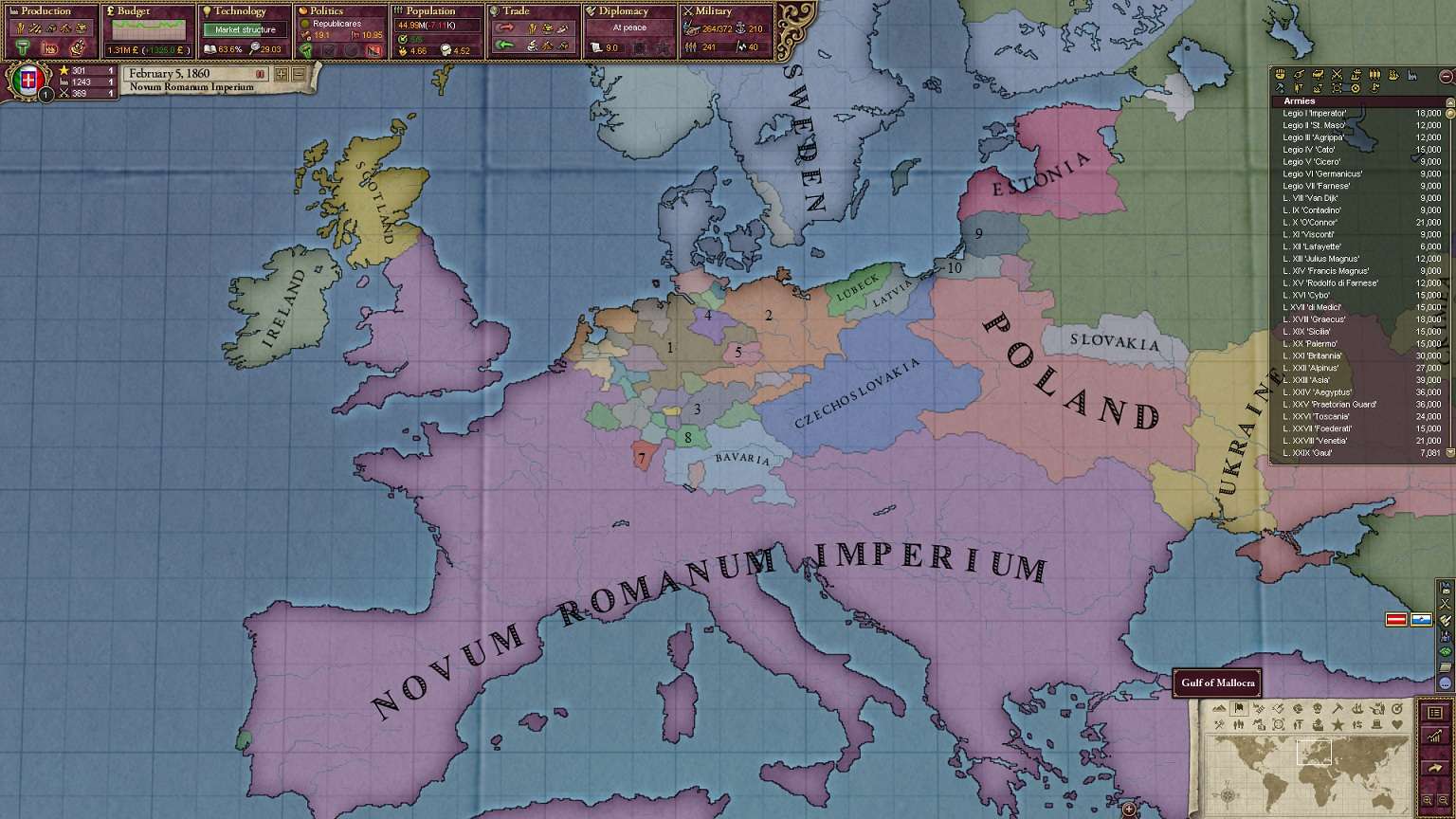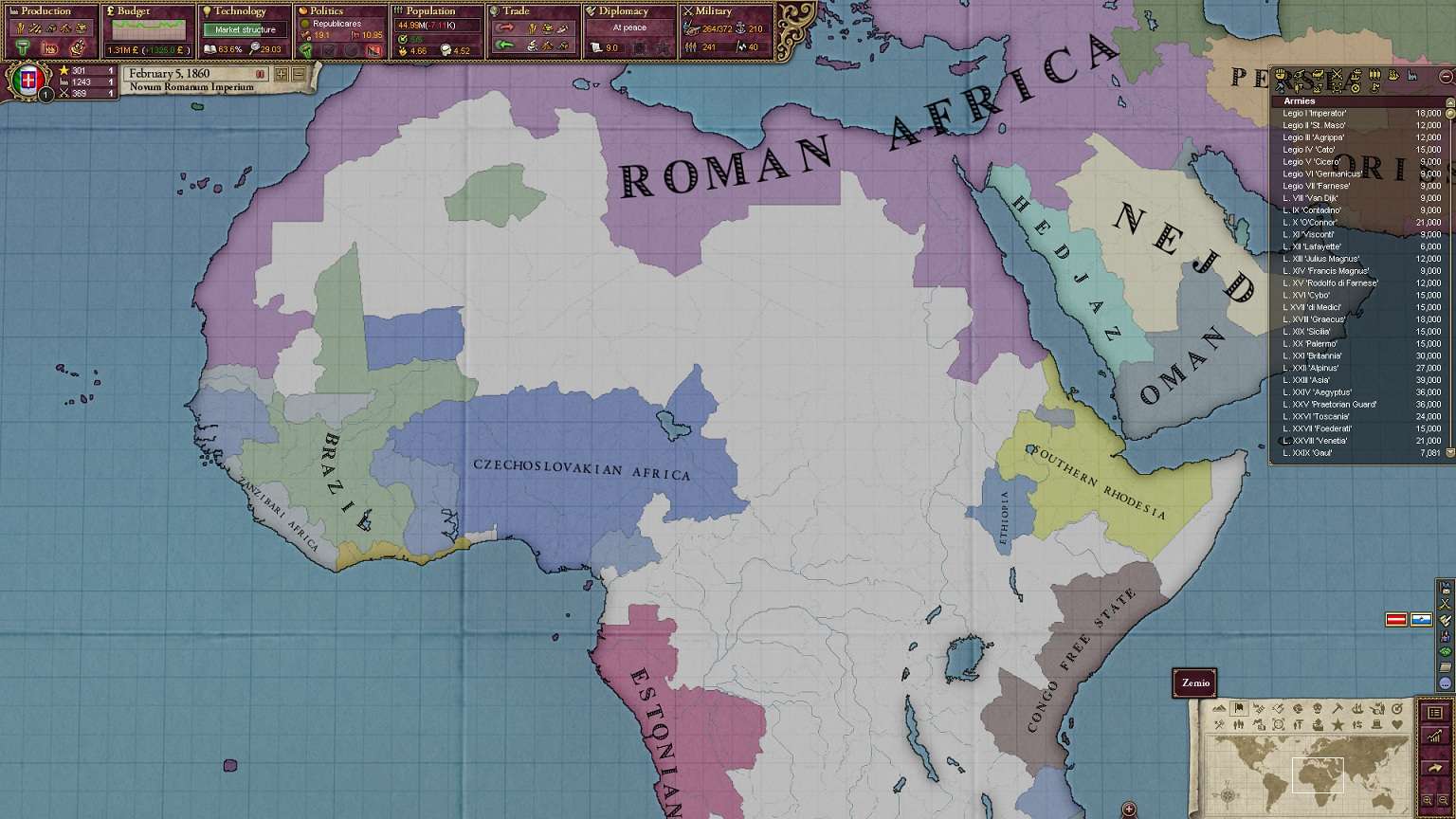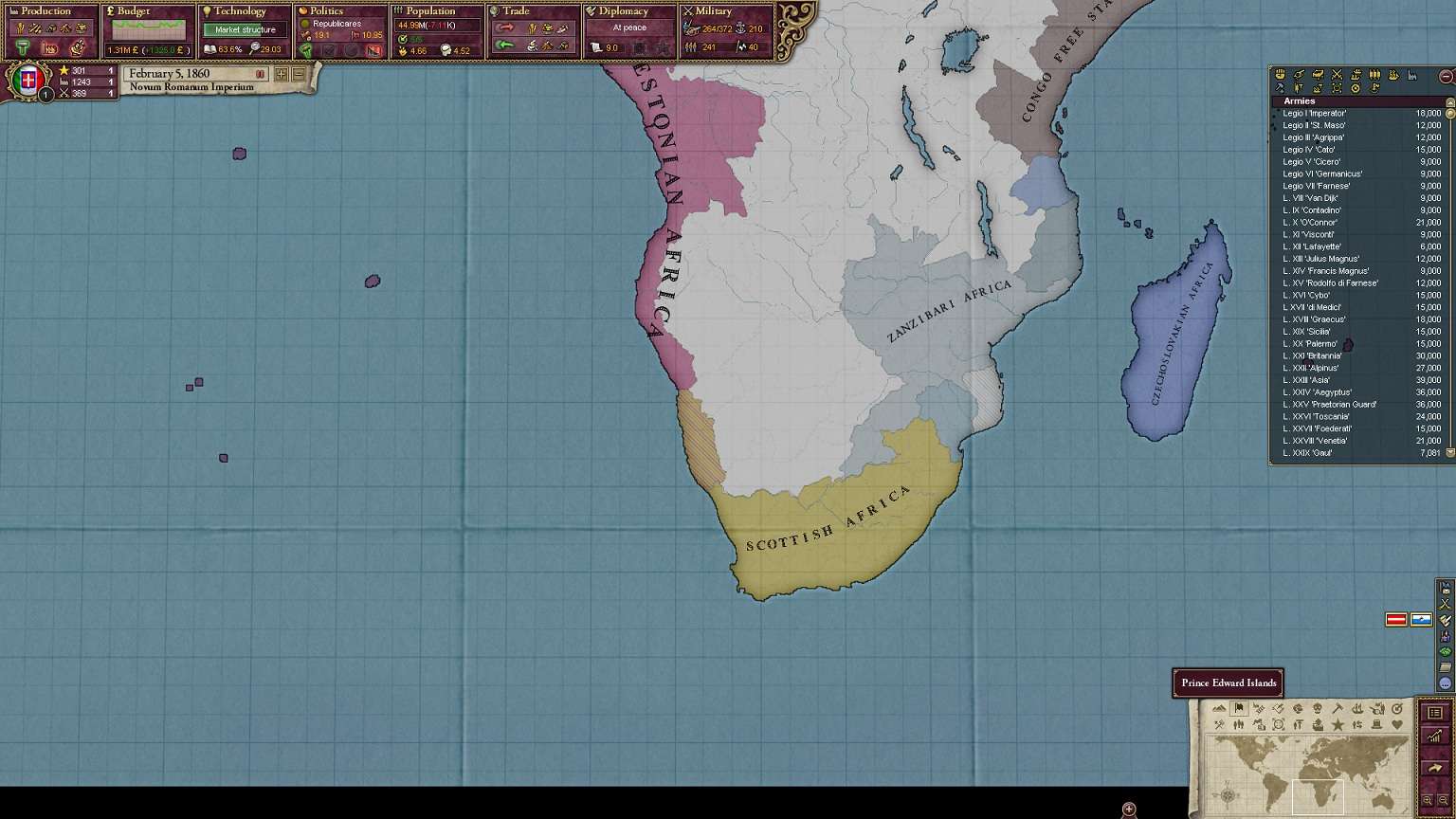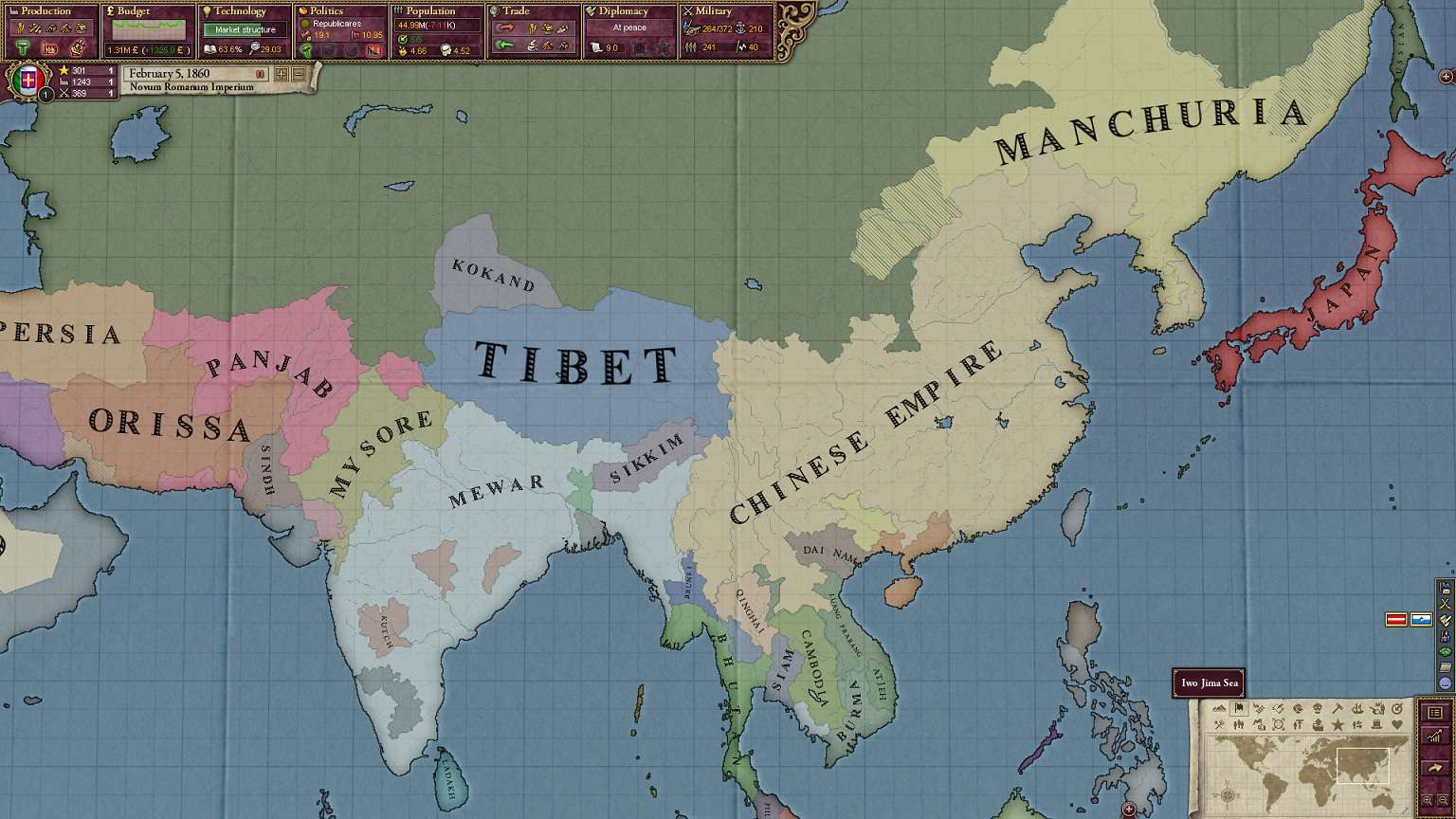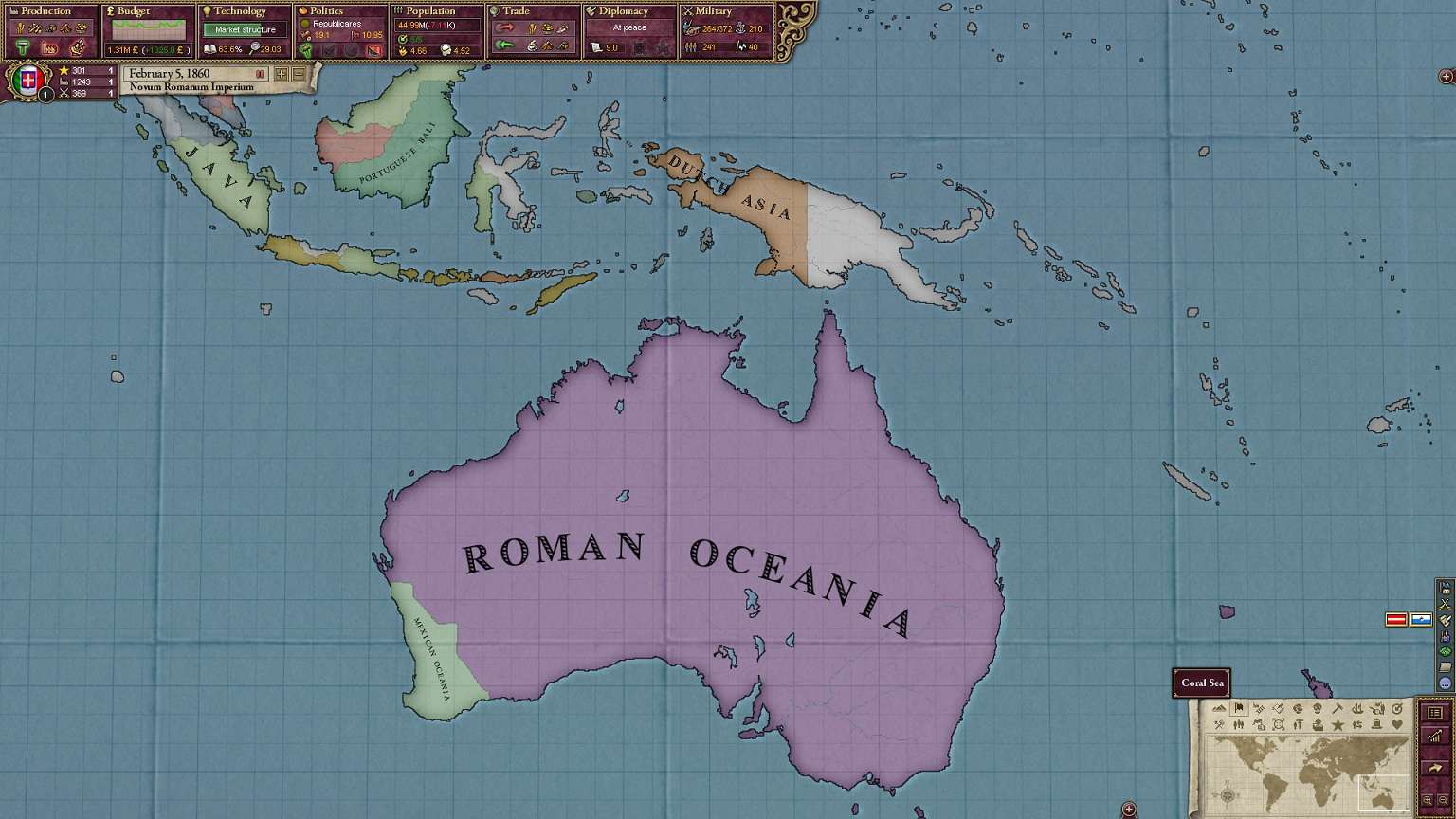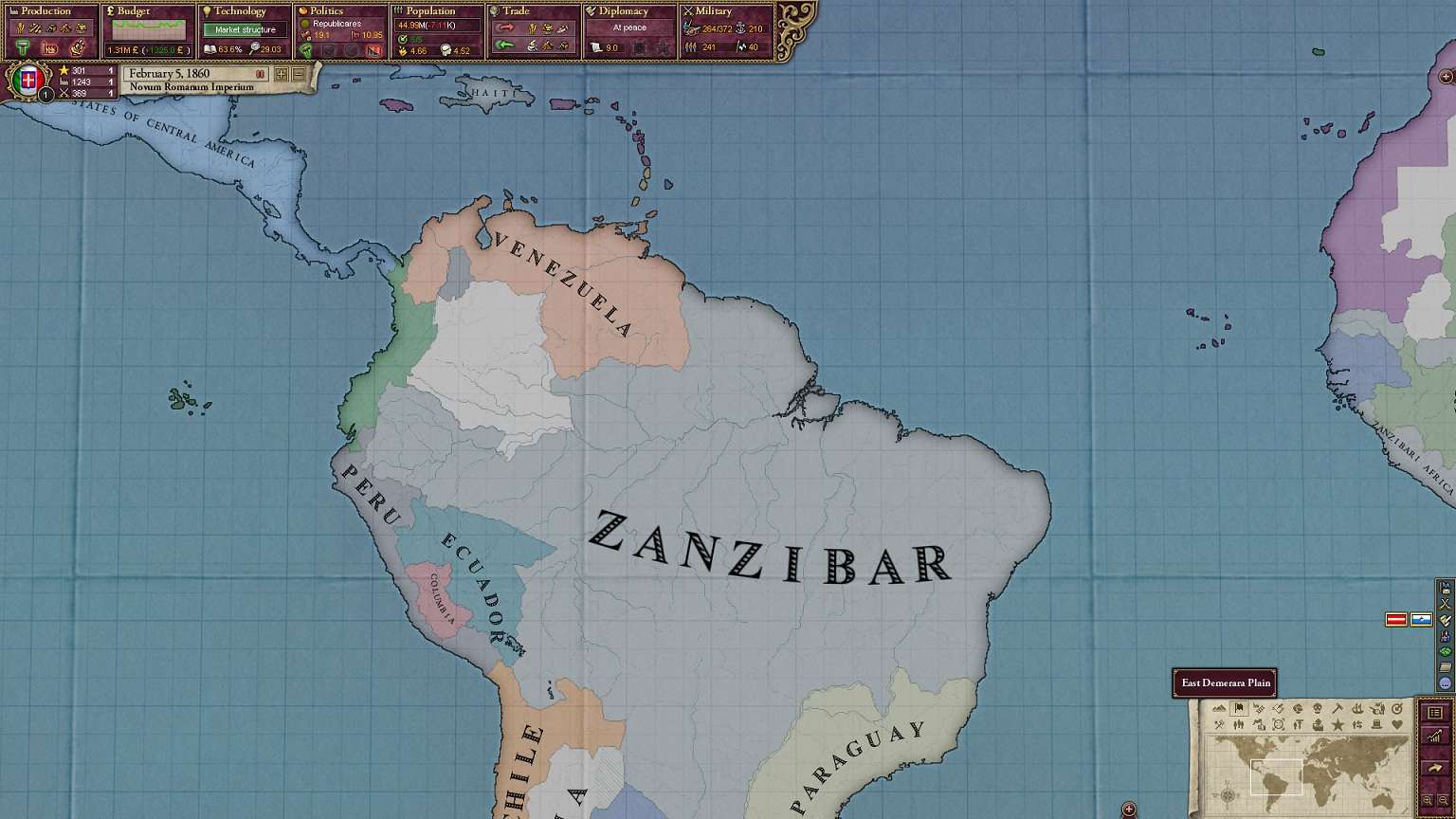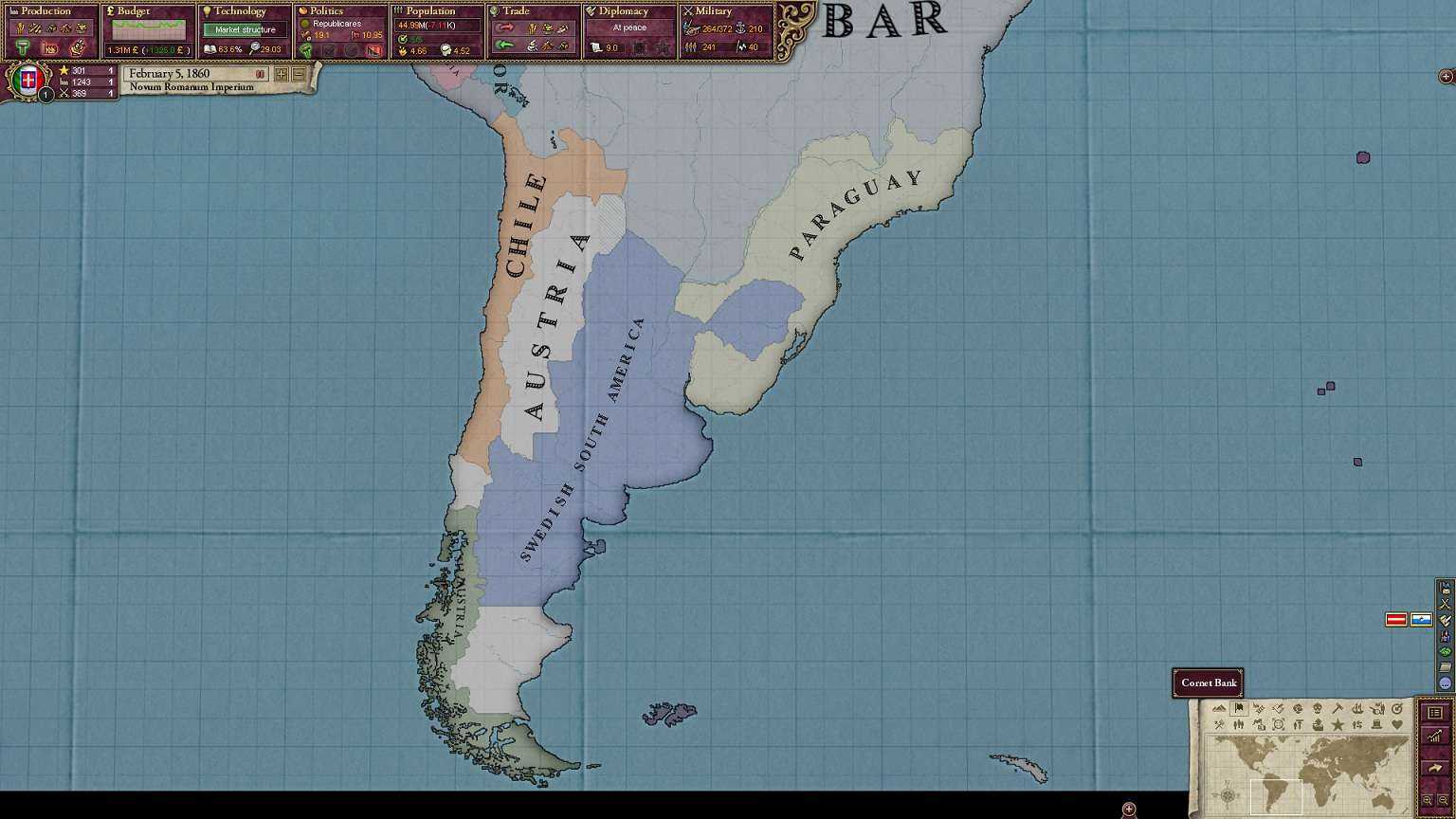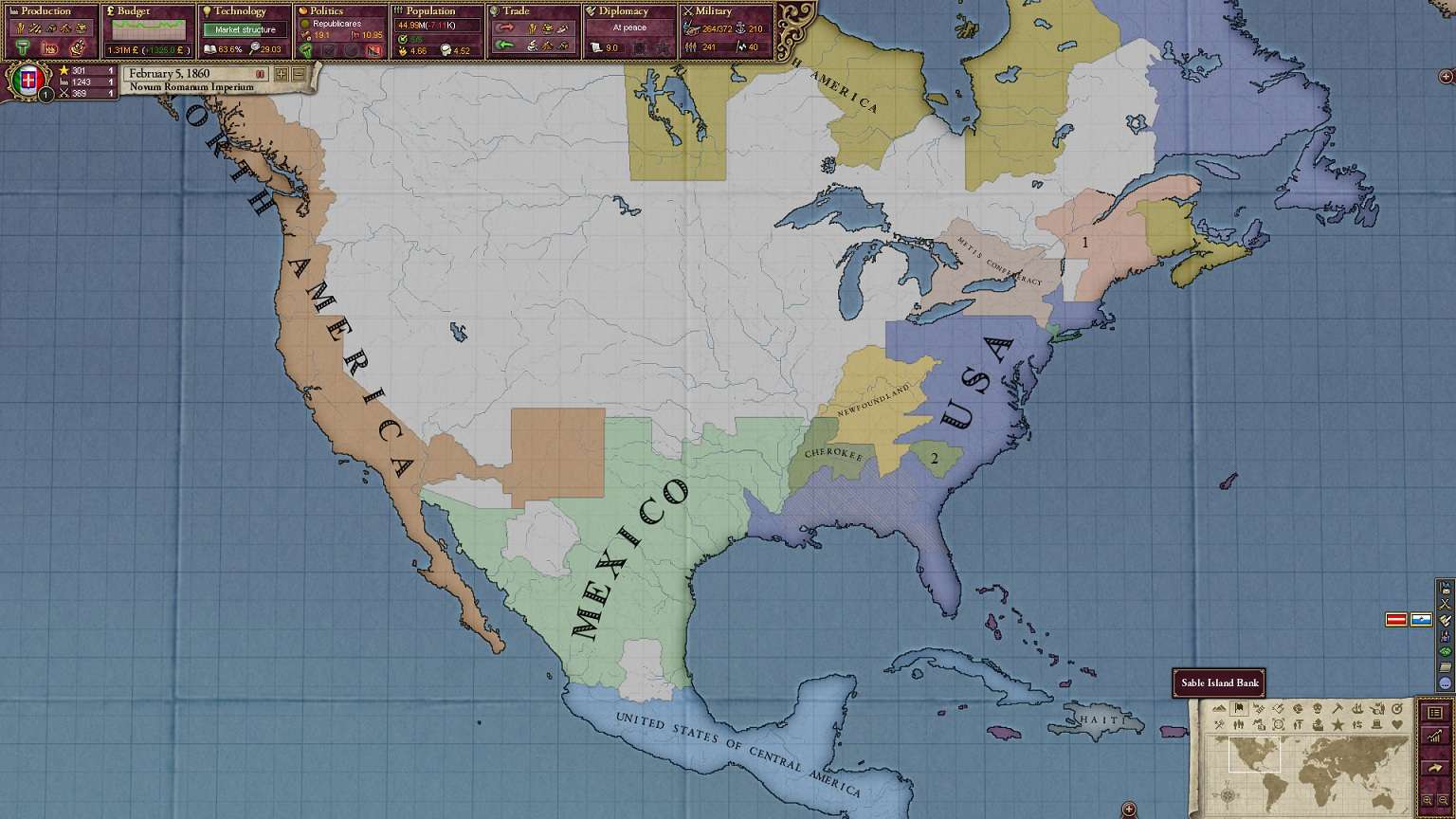Chapter 11, part 2: The price of peace
8 July 1856, Palazzo di Farnese, Rome
Karl Marx, Chancellor of the New Roman Empire, checked his pocket watch. I'm still a little early, but I wonder where everybody else is? Shrugging, he opened the door to the Imperial throne room, only to find the throne occupied. The figure, obviously deep in thought, started a bit when he noticed Marx enter the room.
"The celebrated Chancellor Marx, I presume? At least, we meet."
Karl blinked in confusion as he examined the man who stood before him. "Um, Your Majesty, we've met many times before. Are you feeling okay?"
"I believe you have me mixed up with somebody else, Chancellor. Why... do you suppose I might have a twin running about somewhere?"
Marx cursed himself silently. "Forgive me, Prince Trajan. I did not expect you to come so far so quickly."
A strange look crossed the Prince's face, but it disappeared after a moment. "I was already in Rome for... something else. Nonetheless, this problem of ours affects every Roman."
"Yes, it does."
After another ten minutes or so, the remaining members of the Cabinet entered: Marshal of the Empire Julius Contadino, Deputy Chancellor Agrippa Germanicus, the new Minister of Finance Benjamin Disraeli, Foreign Minister Benjamin O'Connor, Minister of Science and Industry Edward Vickers, and finally, the Minister of Information, Magnus von Horgen. When Emperor Constantine XII finally made his appearance, everybody had taken a moment to get to know everybody else. Disraeli was the newcomer to the group; only Vickers had met him before. The Emperor, nodding to his brother, sat down and addressed the cabinet. "So, gentlemen. What do we make of the new Jacobin rising?"
Magnus von Horgen took that as his cue to answer. "On the surface, it appears bad. Whoever was responsible for coordinating this rebellion had agents within the legions, and some of the younger officers have defected to the Jacobin cause."
The Marshal rose. "I must take full responsibility; I had no idea people with democratic proclivities had infiltrated our army so. You will have my resignation as soon as this crisis is over."
The Emperor waved his Marshal down. "I won't hear of it; nobody saw this coming, not even Magnus. The question we must ask ourselves is, 'What do we do now?'"
Everybody started talking at once. It seemed everybody had their own plan for the rising and thought that shouting loudly enough would get their plan approved. As the din reached a crescendo, the unmistakable sound of a loud walking stick on the door silenced the cacophony. "Constantine, didn't I teach you better than that?" Valerian strode to the table with a purpose. Although he was rapidly approaching 70 years of age, he was surprisingly spry. "You need to take control of a meeting like this, or it will surely take control of you."
Constantine and Trajan both winced at the words of their ex-teacher. "Forgive us, Professore. We meant no disrespect."
Valerian threatened to strike both of them with his staff, then turned to everybody else. "Since I'm here, I might as well straighten you knuckleheads out. Look, there are only a few possible alternatives to deal with the Jacobin uprising. One, we use the legions to crush them. Two, we arrest the ringleaders that we know of. Three, we call up the militia and let them deal with it."
Marx straightened up in his chair. "Four, we negotiate with them." Everybody turned to stare at the German philosopher. "Is what they want so terrible? They want a voice for the commoners, for all people of Rome, not just those with wealth and influence."
Von Horgen retorted angrily, "They also want to get rid of the Emperor. The Emperor is the only thing that keeps us stable. You know damn good and well that we'd never hear the end of the debates and bickering without a strong leader."
"Perhaps the people ought to choose that as well."
Valerian cleared his throat audibly. "Gentlemen, I appreciate the passion you're both showing, but we must consider each option in turn. Let us begin with pure military force. Marshal?"
Julius Contadino nodded. "There is only one major concentration of rebel forces that we know of, which is located in North Africa. The remaining forces are scattered and dispersed; I can only imagine that they'd expected greater communication than they had. If I release the legions to pursue the closest pockets of Jacobins to their locations, I have no doubt we could suppress this rebellion before it got started."
"Thank you. Magnus?"
The enigmatic Swiss noble pointedly turned away from Marx. "I could easily mount an operation to seize the leaders in Wujda without any fuss. I have no doubt that Julius's plan would work, but it would cost lives. My agents, who are already embedded in the legions, could seize control from the Jacobins and force a surrender within two weeks of my order."
Valerian looked a little less sure about his protege's idea, but moved on to the next option. "Who is the titular commander of the militia?"
Constantine answered that one. "Gaius Tullius Cicero, but he is dealing with the family lands in Ancona, which have been struck by some of the terrorists."
The Marshal shook his head decisively. "The militia would get chewed up and spit out. Many of the Jacobins are trained legionaries; they'd destroy the militia in no time at all."
The Chancellor looked angry at the talk of "destruction." "Wouldn't the best way to avoid casualties simply be to talk to them? I have a few friends within the movement still. They might see reason!"
Before Magnus could reply, Disraeli interrupted the Minister of Information. "Karl, we cannot negotiate with those who use such vile tactics to make political points. It would only invite further attacks. What of the French separatist movements? Or the 'Committee for a Free Press?' Could they not choose similar tactics.
Marx growled but said nothing. The CFP was Marx's baby, and Disraeli had chosen it precisely for that reason.
The Emperor took a few moments to consider the situation. "Gentlemen, I believe the legions are best situated to deal with this problem. Julius, make sure that the Generals in command are told to give the rebels every opportunity to surrender. Magnus, use your network to give the Marshal as much information as you can. To everyone else, please return to your duties. We must show no fear or the Jacobins have already won."
As the Cabinet stood to leave, Constantine held up Valerian and Trajan, then waited until the door closed. "What should we do about the wedding?"
Valerian, unusually, had no idea what was going on. "Whose wedding, Constantine?"
The Emperor smiled. "Mine, of course. It was to be a surprise, but obviously we're going to have to worry about this other matter first."
The Russian blinked in disbelief. "You're actually getting married? To a woman?"
Trajan rolled his eyes. "I know, Uncle, it's as big as surprise to me as it is to you. Who is the lucky lass, Constantine."
"Her name is Laura. Laura Datti."
Both Valerian and Trajan did a double take at that name. Valerian frowned, while Trajan seemed to get angry. "Brother, are you mad? There are exactly three families with a claim to our throne. The degli Albizzis are gone. Our family is dwindling. The Dattis remain strong and are much older than our own House. What are you thinking?"
"Of eliminating the only real competitors for the Imperial throne."
The Dattis were the second House to produce Emperors in the old Tuscan Empire. There were five Datti Emperors -- Leo I, Julius I, John I, Leo II, and John II -- and Julius Magnus was one of the greatest Emperors ever to rule. From 1418 to 1544, the Farneses were little more than a family of minor nobility. Francis I -- the first Farnese Emperor -- had only gained the throne by his close friendship with John II. While Farneses had sat in Rome ever since 1544 and the Dattis had receded into the background, there were no guarantees that the Dattis would remain quiet. While the line of succession was clear at the moment -- Constantine, Trajan, and Valerian -- if an accident killed Constantine and Trajan, the next logical Emperor after Valerian was Valerian's brother, Peter III, Tsar of Russia. Very few Romans would take kindly to a union of the two nations, to say nothing for the Russian opinion. That meant that, most likely, the Dattis would regain the throne.
Valerian, ever the student of history, looked more puzzled than anything. "How are there still Dattis? John II had no children and no other family."
"A distant cousin, after a pilgrimage to Jerusalem, decided to stay there. When Jerusalem was taken by the Tuscan Empire in 1593, the Dattis decided to remain there. Until Laura, no Datti has ever left the Holy Land."
Trajan was skeptical, but couldn't help his natural curiosity. "So then how did you meet her?"
"Her father is a merchant, and he held a stall in Cyprus. She was ordered to see what was going on after our annexation, and I met her when I sailed there to formally sign the treaty."
"Charming. But that still doesn't answer my question."
Constantine playfully cuffed his brother on the head. "I wasn't done. Our throne is more secure now than ever. You see... she's pregnant."
After a few moments of stunned silence, joy erupted as all three men celebrated the security of the Empire.
An Empire which, a few miles away, was in incredible danger.
---------------------------------------------------------------------------------------------------------
15 July 1856, Visconti Library, Van Dijk College of War, Florence
Arturo Orsatti had only been back for a week, but already found himself knee-deep in work. In order to officially confirm his captaincy, Orsatti had to complete the Officer's Training Course; a two year, in depth look at grand strategy and tactics from the point of view of a superior officer. Although these were not the concerns of a Captain, they were the concerns of a Commander, and a Captain was only two short steps from that. Included within the training were etiquette lessons and plenty of political familiarization, as Commanders were also hereditary nobles. The legions preferred to give a man knowledge before he needed it, lest he need it before he had it. Admiral di Medici, the Chief of the General Staff, had offered him a shorter course -- only a year instead of two -- if he could pass a brutal comprehensive exam by the end of July. It was a difficult task, to be sure, but the quicker he left the College, the quicker he could rejoin the troops on the battlefield. Arturo was carefully studying an old text on the Tuscan War against the Ottoman Empire when a librarian approached him with a note.
Please come to my office when you receive this note.
Colonel Vincenzo Capello, Vice President, Van Dijk College of War
Arturo looked askance at the librarian, but she was already gone. Orsatti gathered his things and made his way to the office of the Vice President, which was located at the top floor of the library. He knocked gently at the door. "Come."
Captain Orsatti saluted the man who'd given him his promotion but had never met. Vincenzo Capello, as befit an instructor at the College, wore civilian clothes and even had a decidedly non-military beard. "Captain, thank you for coming. Please sit down."
Arturo did as ordered, and scanned the room for a moment. It looked like a typical professor's office, or at least as he'd imagined it. Books lined every wall, and the portrait behind the Colonel's head featured Emperor Constantine (or perhaps Prince Trajan -- one never could tell). "Reporting as ordered, Colonel."
"How are your studies?"
"Just fine, sir."
"Any difficulties?"
"None, sir."
"Good, good." The Colonel got up to grab something from a cabinet behind him, flipped through pages for a minute, then extracted a single document. "You are close friends with the Emperor and the Prince, are you not, Captain?"
Arturo squirmed a bit. "I wouldn't say close, sir, but yes, I do know them better than some, I suppose."
Capello grinned. "Don't be too worried, son. You aren't in trouble. Take a look at this."
The document Arturo received was a handwritten note, with Chancellor Marx's name at the top and the Colonel's at the bottom. As Arturo read, although he couldn't tell, his face turned red. This was nothing short of an invitation from Chancellor Marx to the Colonel to participate in the Jacobin rebellion! "Colonel, is this document... accurate?"
"It is, Captain. What do you make of it?"
Arturo practically spat out his response. "The Chancellor is guilty of treason, sir!"
"My thoughts exactly. This is a delicate matter, as you might suspect, Captain. Anything I ask of you stays between us. Understood?"
"Yes, sir."
"Very good. This letter is certainly damning, but I fear that the Emperor will want something more conclusive. I'd like a chance to conduct a covert investigation so that the Chancellor doesn't get wind of it."
"That makes sense, sir."
"What I want from you is to accompany my handpicked investigator -- Lieutenant Commander Beretta -- to the Palace and help him get through security more efficiently. You're known to the palace guards, but my man is not."
"Couldn't you just give him official orders?"
"The Chancellor gets copies of all such orders, Captain."
Arturo was uneasy. Asking a mere Captain to assist in an investigation of this magnitude was highly irregular. At the same time, the Colonel did have a point. After hesitating for a few moments, the Captain nodded firmly and saluted. "I will do as you ask, Colonel."
"Excellent! My investigator will meet you tomorrow afternoon outside the palace. Thank you again for your assistance."
------------------------------------------------------------------------------------------
20 July 1856, Chancellor's Office, Rome
Arturo Orsatti entered the Imperial Administration Building with trepidation. As Colonel Capello expected, the investigator had found more letters -- undelivered ones -- in the Office of the Imperial Censor inside the Imperial Palace. These letters implicated almost the entire Cabinet in the Jacobin uprising, with the exception of only the Emperor and the Prince. Even Marshal Contadino had sent letters to his trusted commanders to join the Jacobin uprising, overthrow the Empire, and install a democracy, ostensibly for the people but in reality dominated by the Marshal and his cronies. Flanked by three men on either side, Arturo made his way to the Chancellor's office and pounded on the door. "Open up, by the order of the Imperial legions!"
When Chancellor Marx answered the door, he had a very confused look on his face. "Arturo, I'm glad to see you, but is this some kind of joke? If it is, it's not very funny. I have things to do."
"Like betray the Emperor, Chancellor?"
"What on earth are you talking about, son?"
Arturo threw the letters at the Chancellor in disgust. "You are under arrest for treason, Chancellor. Please come with me."
The truth dawned on Karl, and he got angry, but not so angry he didn't pick up the letters first for neatness's sake. "What the... have you read these, Captain?"
"Yes, I have. As you obviously have, since you wrote them!"
Marx sighed. "I didn't write a single word of these."
"Of course you did! They're in perfect... Latin..." Arturo stopped himself as he considered the letters more carefully.
"Figured it out, didn't you."
Karl Marx's Latin was horrible; so horrible that he was teased unmercifully for it, not just in private, but even the newspapers mocked him. Marx was the only government official who had a clerk write everything for him because he couldn't. He could speak Italian fine, but his Latin was atrocious.
"I... I am so sorry, Chancellor. Colonel Capello was so --"
Marx's eyebrows shot up. "Capello, you said? Vincenzo Capello?"
"Yes. Why?"
Marx swore. "We need to get to the Imperial dungeons. Now!"
As they raced to the dungeons, Arturo's mind raced. How could I have been so stupid? I was so ready to believe the Chancellor's willingness to cooperate with the Jacobins that I lost my head.
The Captain, Chancellor in tow, presented his credentials to the lieutenant at the front desk, who saluted. "Where are we going, Chancellor?"
"Did you hear of the Battle of Wujda, Arturo?"
"No."
"The largest Jacobin army was defeated and its leaders captured yesterday; we're going to see one of them."
"Who?"
"You might want to read the battle report."
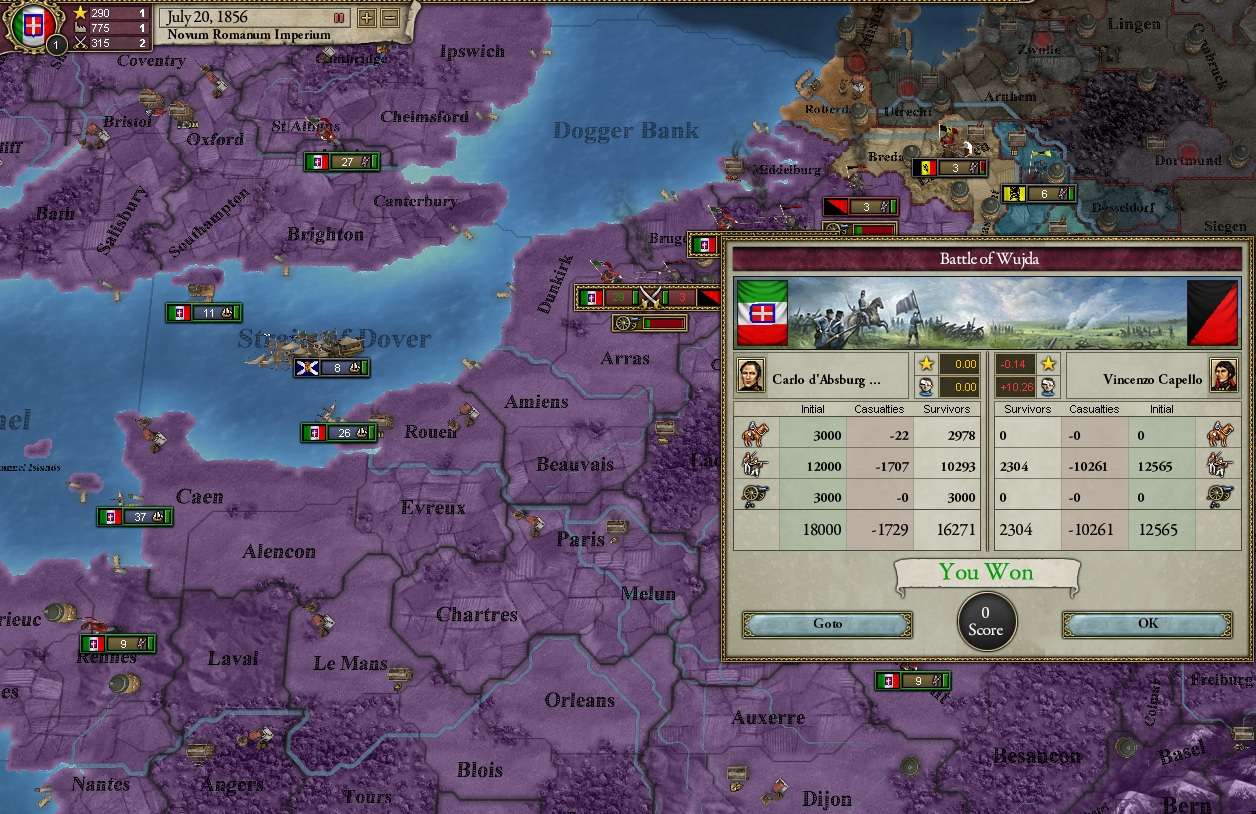
Just as Arturo read the name of the commanding General, a huge explosion sounded about a mile away.
It was the Imperial Palace.
------------------------------------------------------------------------------------------
3 August 1856, Imperial Dungeons, Rome
Arturo never had a chance to talk with "Colonel" Capello; with the explosion at the palace, the entire city was locked down. The bomber -- "Lieutenant Commander" Beretta -- had immediately fingered Arturo Orsatti as his accomplice in order to save his own skin. While the damage was dealt with, the Colonel in charge of Rome's garrison had Arturo thrown into the dungeon until everything could be sorted out. The young Captain was too busy trying to make sense of things to object too strenuously. Arturo felt absolutely terrible about the whole situation; in a cell a few doors down was Alfred Nobel, a Swedish chemist. His newest invention -- termed "nitroglycerin" -- had been used in the bomb. While Nobel had no idea where the bomber had gotten his experimental substance, Minister Vickers had already commissioned the finest scientists in the Empire to not only unlock Nobel's inventions but to extend the entire field of inorganic chemistry.
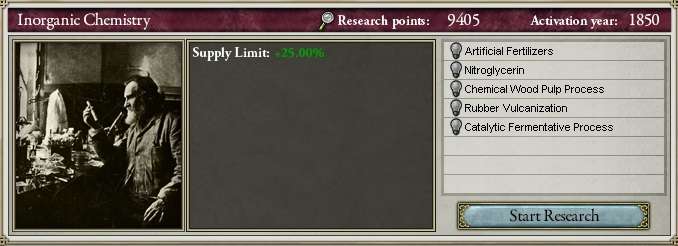
Nobel seemed even more unnerved than Arturo; he'd only been traveling to Rome for a scientific conference when his carriage was assaulted and his formulas stolen. The young Captain had struck up a friendship with the Swede while he awaited his fate.
"Orsatti, a visitor!"
As Arturo looked out through the bars, he was dismayed to see Caroline Sheridan. "Arturo, are you okay?"
"Caroline, what are you doing here? Shouldn't you still be in Australia?"
"I left a couple of days after you did; Foreign Minister O'Connor recalled me."
"Can you tell me what's going on?"
Caroline sighed. "The bomb leveled most of the palace; I don't know how many people are dead."
"The Emperor?"
"He and Prince Trajan are safe. I know that Marshal Contadino, Admiral di Medici, and a dozen Generals were killed; Valerian is mortally wounded and may not recover."
Arturo groaned. "If only I'd known..."
Caroline looked sympathetic. "Arturo, Capello fooled a lot of people. The only reason he didn't succeed was that the bomber got the day wrong; he was supposed to set it off the day afterwards."
"Why? What was supposed to happen then?"
"The wedding of the Emperor and Laura Datti."
Arturo couldn't breathe for a few moments. They nearly killed every single notable person in the entire Empire! Once he'd regained his composure, he addressed the young Englishwoman in front of him. "What of me?"
"I honestly don't know. There is no high command right now. The Emperor hasn't replaced any of the positions yet, because he isn't sure who he can trust."
"I understand." Arturo took a deep breath. "Thank you for coming, Caroline."
Caroline chewed on her lip for a moment, but only nodded wordlessly as she turned and left. The guard let out a barely audible whistle as Caroline left. "That your girlfriend, Orsatti?"
Arturo chuckled faintly, the first time he'd had occasion to laugh in a long time. "I don't even know."
------------------------------------------------------------------------------------
1 January 1857, Marshal's office, Florence
Trajan had always wanted to be in the legions from the day he saw his first soldier. He'd always known Constantine would be Emperor, and he didn't begrudge his brother that. He would serve honorably in his own way. Now, however, his world was completely transformed. He wasn't yet 20 years old, but was the most powerful military man in the world -- the Marshal of the Roman Empire. Constantine wanted to make sure that his new Marshal would be loyal, and he could think of nobody more loyal than his own brother. The new Chief of the General Staff -- Cyrus Datti, his brother-in-law -- had been a mere Colonel in the Jerusalem garrison before taking his job. It wasn't that the two men weren't qualified for their jobs, but they were, to say the least, extraordinarily young for their positions.
Even Constantine's wedding to Laura was a muted affair, with only a half dozen guests. Technically, the baby wasn't going to be born for another month or two, so Trajan was still Prince of Constantinople, but at the moment, nobody dared question Constantine. At least the non-military portion of the Cabinet was almost entirely intact; Benjamin O'Connor had been at the meeting, but was waiting outside in the antechamber; he was severely hurt in the blast, but not mortally so. He'd stepped down as Foreign Minister; Gaius Tullius Cicero had taken the spot until a more suitable replacement could be found. Caroline Sheridan's name had been proposed by Benjamin, but her relationship to Arturo Orsatti made her a questionable choice, not to mention the fact she was a woman. James O'Connor, Benjamin's son, would carry on the family tradition as a lowly clerk in the Ministry; still, James had graduated the year before at the top of his class from the University of Rome. At the age of 16, that had been quite the accomplishment.
Trajan tried to focus on the material on his desk, but couldn't. Yes, the siege of Uskudar had eliminated the last rebel stronghold.

He'd ordered 18 more brigades of Guards to shore up the legions after the dual loss of the defections and the casualties. The Guards were given extra special training and thoroughly investigated before they so much as looked at a rifle, and yet, nobody felt completely sure that the Jacobins were totally gone. Capello and Beretta had been hung, so that good Roman bullets wouldn't be wasted on them, but even a fake Colonel couldn't have planned the whole thing. There had to be something more. Magnus von Horgen insisted it was Marx and always had been Marx; Trajan (and more importantly, Constantine) didn't believe that. Titus Decimus was another candidate, but most considered him an idiot and even less likely to be in charge. The truth was, they'd probably never know unless the Jacobins were dumb enough to rise again. I almost hope they try something; it'll be the last thing the bastards ever do.
Still, for many Romans, life had returned to some level of normalcy. The Senatorial elections returned, once again, a Conservative majority. The Reactionaries, led by Titus Decimus, held steady, which was another reason that Trajan didn't think Titus had masterminded the operation -- he had powerful friends that wanted a stronger Emperor, not a weaker one, and if he angered them, he'd be completely cut off from Roman society.
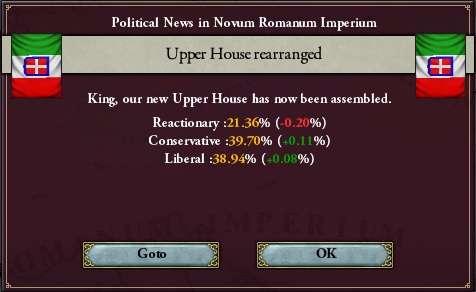
The sound of heavy iron dragging through the halls reminded Trajan of his most difficult task; the question of Arturo Orsatti. The Emperor hadn't wanted a formal court martial, but to have things taken care of by Trajan personally; Constantine would follow his brother's recommendations. As expected, the guard knocked on the door, and Arturo entered the room. The giant from Milan looked terrible; he stunk and his beard was so bushy you could barely see Orsatti's mouth, even when talked. At a nod from Trajan, Arturo's chains were removed, but the guard remained inside the room. Trajan sighed, but understood why; he was still the only Farnese who could inherit the throne, and a crazed "traitor", as some saw him, might get some unpleasant ideas.
"Arturo, let's get straight to business." Arturo nodded slowly, wincing in pain. "Had you ever met Colonel Capello prior to your visit to the Vice President's Office at the College?"
"No." Arturo's voice sounded as hollow as a sepulcher, but there was no malice, no judgment for his imprisonment. Simply an acknowledgement.
"Are you aware that the War College has no Vice President and never has?"
Again, the agonizingly slow response. "No. I wish I had."
Trajan nodded and checked a box on his sheet. "Have you seen Colonel Capello since that period?"
"Only in the newspaper."
Daguerreotypes had just recently been added to the Roman Times; although the technology was already somewhat old, the expense for producing them in large numbers had made their inclusion a rarity until the wedding of the Emperor and Empress demanded it. Trajan stared straight at Arturo when he asked his next question. "Did you have any foreknowledge of the Jacobin plot?"
"No, sir."
"Why did you not report your contact with Colonel Capello to Admiral di Medici or Marshal Contadino?"
Arturo snorted in derision. "The monster said they were part of the conspiracy."
"I see." Trajan stood and began to pace. "I'm beginning to think, Arturo, that the entire rebellion was just an excuse to set off the bomb in the palace. The Jacobin leadership isn't stupid; they had to know an armed uprising was the last possible way they could ever succeed. The bomb was a better bet, and it almost worked. It might still. If not for the Russian Empire's backing and the new legions coming up, other countries might take this as a sign of weakness."
"Possibly, sir."
It was Trajan's turn to laugh dryly. "I don't suppose you have much interest. I can't say I blame you."
"Why didn't somebody else catch Capello was a fraud, sir?"
Trajan's laugh died. "Because he wasn't. There was -- still is, actually -- a Colonel Vincenzo Capello. Older files don't include physical descriptions, and Capello is an Italian Civil War veteran, believe it or not. He lives in Alexandria; with no system for pensions, he's been on half-pay for ten years now. I'm told he sent a very angry letter to the Times for destroying his reputation. The man you knew as Vincenzo Capello was a legionary too, but a mere Lieutenant. He worked for the Quartermaster, which is how he got the uniform."
"What was his name?"
"He never gave us one. His paperwork as a Lieutenant, while legitimate in all other respects, had a false name on it. 'Jacopo di Farnese', if you can believe it. Beretta was a Sergeant in his squad -- his name was actually Beretta, by the way -- and eager to please his superior officer."
Arturo's head snapped up at the word 'paperwork.' "What about the clerk?"
Trajan frowned in puzzlement. "Clerk?"
"The one who passed me the note? The librarian's clerk?"
"What did he look like?"
Arturo shook his head. "Not he. She."
"Arturo, are you positive it was a girl?"
"It's kind of hard to miss something like that, sir."
"Son of a -- Arturo, let me tell you something. I have been in that library every day since I got this job. Do you know how many female employees I saw at the library?"
"How many?"
"None. Not a single one."
"Then she's probably in on it!"
Trajan nodded vigorously. "I think you're right. I'll have to send a telegram to Magnus when we're done; if we can track her down, we might just have a chance." After Trajan scribbled out the message, he turned his gaze back to Arturo. "What do you think I should do with you?"
"Honestly, sir? I probably deserved to be on the gallows with the Colonel and the Lieutenant Commander."
"No, I don't think that's right, son. You're as much a victim as anybody that died in the blast. If you and the Chancellor hadn't gone to the prison that day, Capello might have escaped with only imprisonment; nobody else knew of his connection to the bomber. We probably never would have caught the bomber either."
"What of Mr. Nobel?"
"He's already been released; he actually felt just as badly as you do and has been working with our staff to recover his lost research. You're the only 'loose end', so to speak." Trajan studied the man across from him for a moment while he considered his alternatives. "I don't believe you're at fault at all. In fact, I'm going to order your immediate release with the full apologies of both myself and my brother."
"That's... very generous of you."
"I'm not done yet, unfortunately. The real question is what we do with you after your release. Since 'Capello' promoted you -- the Admiral signed off on it, but the original promotion is still illegal -- you're technically a Centurion still. That's no big deal, in and of itself, but there's a larger issue. Even though you're being released, you still committed a crime by letting Beretta into the Palace. If you stay in the army, you'll probably never be promoted again, and you might not see Europe until you're old and gray. I have an order, right here, permanently assigning you to the Jamaican garrison. The climate is lovely, or so I'm told."
"I understand, sir. I will go where I am ordered."
Trajan held up a finger. "There's another choice. You can resign your commission."
"And do what?"
"Believe it or not, Chancellor Marx has specifically asked for you. He appreciates your integrity, and has made multiple appeals on your behalf, whether you knew it or not. We could also find you something else anywhere you like. You'd never be part of the army again, but you would stay in Italy. That would be good for you and your lady friend, right?" The last question slipped out with a sly grin.
"I... uh... maybe..."
Trajan chuckled. "So anyway, that's your choice."
Arturo considered for a moment. "I think I will give you my resignation, sir, and continue to serve the Empire as a private citizen."
"I had a feeling you would. You'll report to the Chancellor tomorrow."
"Yes, sir. And... thank you for the opportunity."
-----------------------------------------------------------------------------------------
30 August 1857, Office of the Minister of Information
Magnus von Horgen growled at the Emperor's decree. So you're going to add yet another responsibility? Counterfeiting? Why on earth would we let private individuals print money?
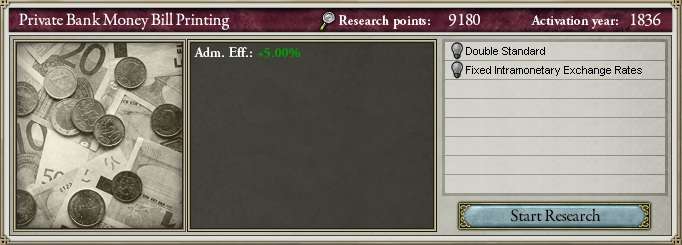
Von Horgen studied his list of agents, identified two likely candidates, and wrote orders to get them to Rome for the 'counterfeiting course' being hastily set up at the University of Rome. Probably run by the same eggheads who sit in their fancy office chairs all day without setting a toe outside their doors, while people like me do all the real work. Magnus, unbeknownst to most of his colleagues, had actually argued for Arturo Orsatti to be assigned to his ministry, but Marx was the golden boy, so Magnus once again got stuck with the dregs. Magnus's most powerful supporter had been Valerian; with his untimely demise, Magnus went largely unappreciated. Some of Magnus's friends had tried to get his appointment removed from the Cabinet, as the Marshal's was, so that he couldn't be voted out by the Curia. No such luck; Marx vocally opposed the bill every time, like the offensive little cockroach he was.
What we really need is a proper police force, not just my agents. Yes, it's convenient to let local garrisons do the work from a manpower perspective, but they're something of a blunt instrument. We don't need a 'Ministry of Information'; we need a 'Ministry of the Interior.' Magnus didn't even have the luxury to live where he wanted; his home was one of the closest kept secrets in the entire Empire, and he changed it every six months. The location of his Ministry changed every year. Magnus knew he was the most unpopular Minister and that most citizens regarded him with fear. That was fine with Magnus, as long as it was accompanied by respect.
Von Horgen was the oldest member of the current Cabinet. He predated the factions, predated elections, even predated the Emperors. At 60 years of age, he remembered the Italian Civil War with clarity and disdain. Clarity because he'd been in his 20s; disdain because he'd -- originally -- chosen the wrong side. He'd joined the Pretender's forces as much to rebel against his parents as out of any conviction for John IV's candidacy for the Imperial throne. When the Roman war machine absolutely obliterated John's attempt at resistance, Magnus had been one of the first to surrender, in respect for the raw power of his one-time enemy. Valerian had accepted his surrender and given him a job as one of his closest assistants. When Valerian was Minister of Information, Magnus was his Deputy. He served the Empire with unflinching loyalty, obeying the orders of the Emperor even when they were counter to the Empire's security.
His lip curled in what was a smile only by dictionary definition; in intent it was something far, far different. Magnus had decided to do what nobody else had the courage to do. The Emperor was a mere child; his Cabinet was full of fools and dreamers -- not that they were any different. The single person Magnus respected, other than himself, was the mastermind behind the Jacobin uprising. Even as he personally regretted and hated his failure, he knew that he had been defeated by a true genius. The only way to defeat a genius was to try anticipate his moves before he made them, and so Magnus had decided to attack what he saw as the root cause of Jacobinism.
The Suffrage Movement.
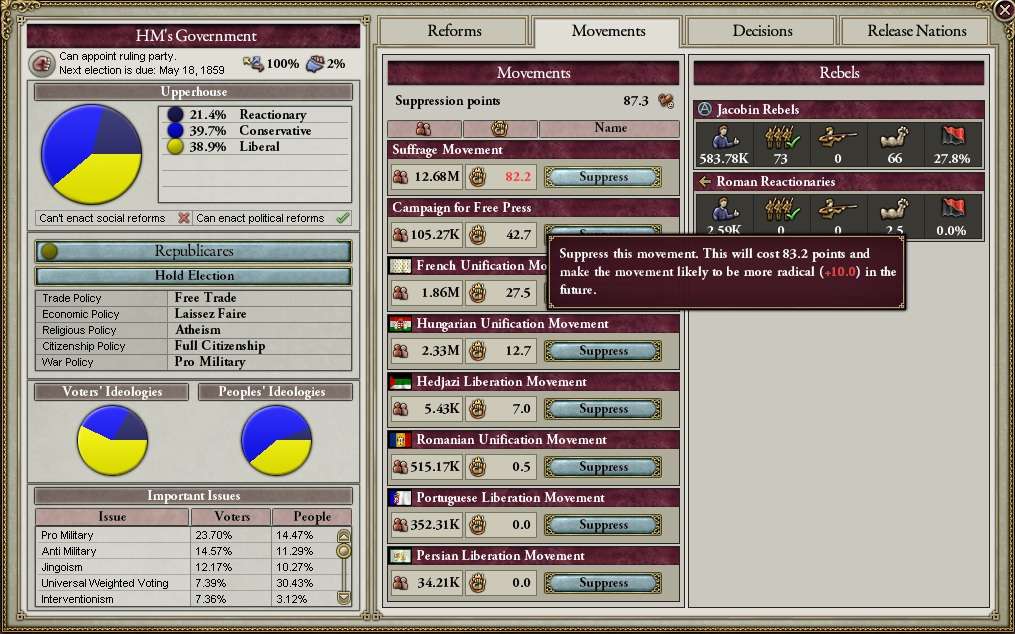
---------------------------------------------------------------------------------------------
7 February 1858, Office of the Minister of Finance, Venice
The moment that Benjamin Disraeli was appointed as Minister of Finance, he'd done three things. He and Edward Vickers had gone to celebrate, he'd told his wife, and he'd made his first order to move the Ministry. The British gentleman knew that he was supposed to be little more than an accountant for the Empire, but he'd already greatly expanded the duties of the Minister of Finance out of brute competence. In fact, even the name "Ministry of Finance" was a thing of the past; his new title, "Minister of Commerce," had been confirmed at the same time as Magnus's new title, "Minister of Security." Disraeli still did a lot of bookkeeping, to be sure, but he'd also gained oversight over foreign trade. Industry remained the bailiwick of his old friend Vickers, but anything foreign trade related came through Disraeli's office. In this secondary capacity, Disraeli justified a move to Venice, which was Italy's largest commercial port. He'd even pushed for London or Constantinople, but given the difficulties of getting to Rome from either of those two cities, Venice was a nice compromise.
As Disraeli studied the latest data his subordinates had gathered, he contemplated what he could do for the Empire.
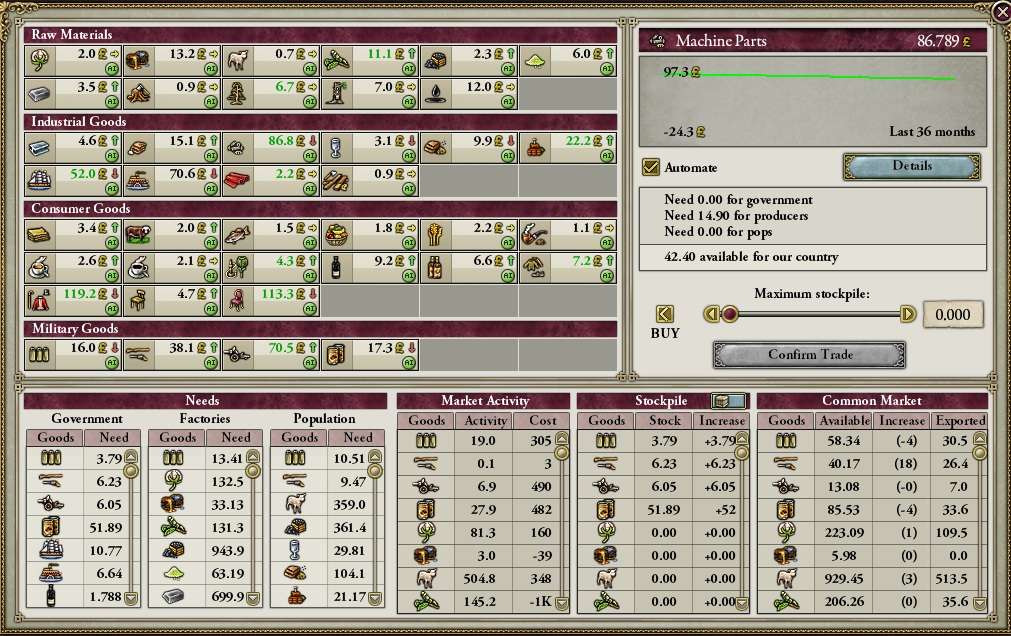
Machine parts... that would be an excellent way to boost our economy! Disraeli immediately authorized a portion of government funds to Northwestern England; by shifting the "National Focus" there, he encouraged basic industry. In an economy like Rome's, the government could only influence, not instruct, the private sector, which was what Disraeli thought it ought to be. He wished he had a little more influence, but that was pure politics and of minimal utility at the present. He also had a less pleasant duty; providing support for another outbreak of flu, this time in Paris. His heart went out to the French people, and he'd had no qualms at all about signing the purchase order for additional medication to combat the terrible disease.
Disraeli shook his head to clear his mind, and with the morning's work done, he picked up the newspaper and scanned the headlines. "Flanders merchant insults the Empire... First Daguerreotype of the Heir to the Throne, Prince Ferdinand... Special Election to be held for Senate seat in Milan... Massacre in Geneva..." Although the others were of interest -- Flanders had already issued an official apology, so the news was a bit out of date -- the last made him look closer.
Geneva, Helvetica
Troops of the Ministry of Security opened fire on a demonstration of the Suffrage League, killing 25 and wounding another 100. Minister of Security von Horgen, when asked for comment, refused to respond. This occurred mere days after the Ministry of Security closed the League's headquarters in Geneva, London, and Paris within hours of each other. A source within the Ministry has provided the Roman Times with evidence of thorough Jacobin penetration of the League. We have, at press time, not received further confirmation, although if the Ministry's claims are true, that could explain the sudden viciousness with which they have acted.
Disraeli felt himself growing ill. He made it to a trashcan just in time. What in God's name is that lunatic doing? Doesn't he know there will be consequences? After cleaning himself up, the Minister of Finance began writing a letter to the Emperor, tore it up, and ordered his staff to make his private car ready for transit to Rome.
Somebody had to tell the Emperor.
----------------------------------------------------------------------------------
10 January 1860, Office of Science and Industry, Rome
Edward Vickers had been extremely busy as of late, with new advances in technology being completed almost as quickly as he could authorize them; finally, for the first time in a long time, the Romans had a positive budget.
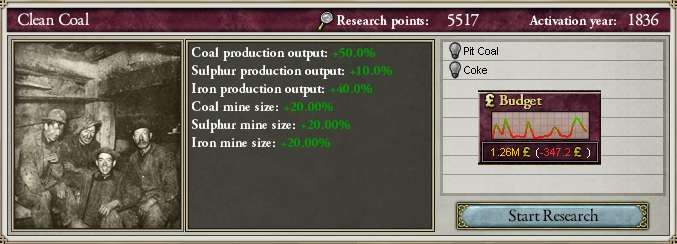
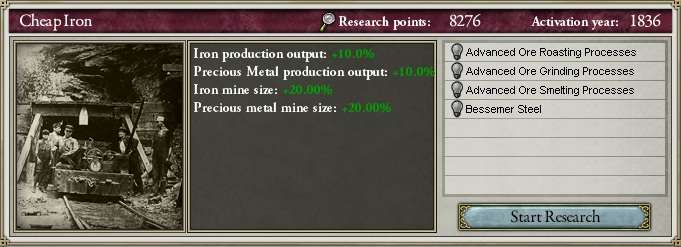
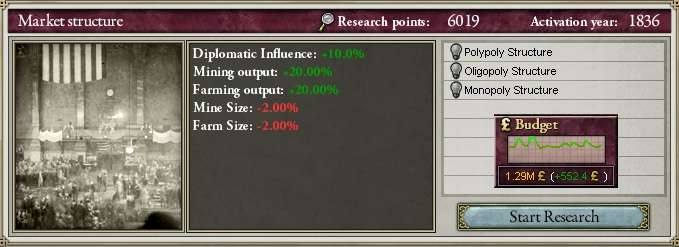
Disraeli had been the one to recommend a thorough look at the structure of the Roman market after the resource extraction industries in coal and iron had been given brand new equipment. Vickers took a moment to pray that the Empire would not use up this budget quite so quickly, although there were already rumors of new advances in naval technology being considered in the offices of the Marshal of the Empire for the future. Yet another nasty bout of influenza had ripped through the Empire, which cost no less than 63,000 £ to fight.
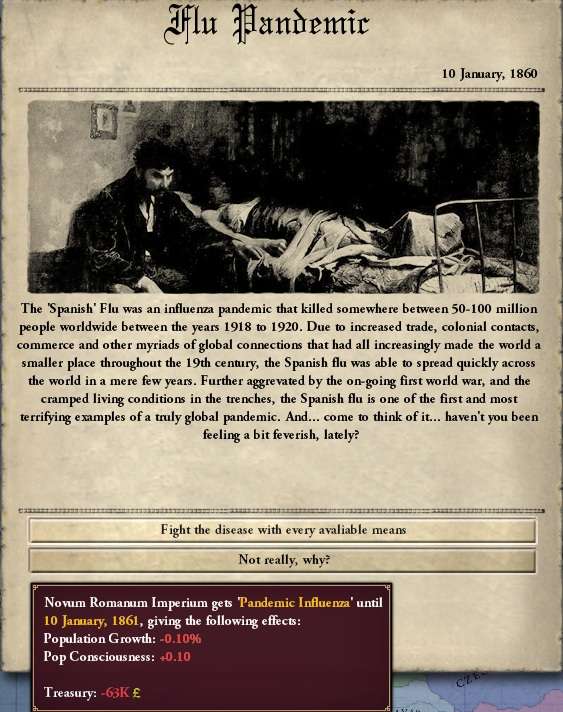
Of course, absolutely nobody was talking about the economy any more. Yes, part of that was because men like Vickers and Disraeli, by increasing the supply of raw materials and attempting to reform the financial system, had reduced the costs of factories producing new finished goods. The reform in the market structure would streamline the sale of these raw materials by allowing the price to fluctuate as need be and would even improve Rome's diplomatic influence as she pushed for further free trade. Already, Rome's newest ally, the Netherlands, had signed a treaty for both military and economic cooperation after unseating Bavaria's claim to the title of Great Power.
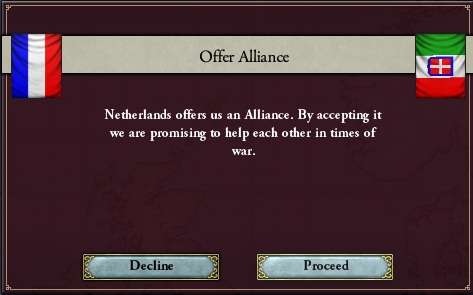
All of that was irrelevant. The talk of the Empire was the election of 1859. The Senate had steadily gained more liberal representation; as a politician, this worried Disraeli, but as a Roman, he was delighted. If the people felt confident enough to vote for the liberals, they must have thought the liberals were doing a good job with the economy, and for better or worse, Disraeli was associated with the liberals by being part of the government.
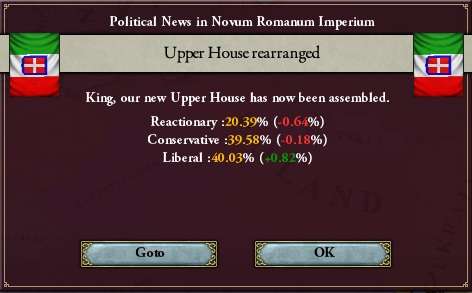
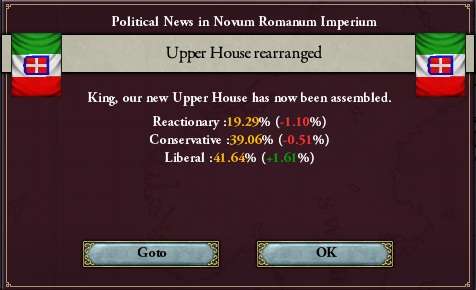
The real shocker was the elections to the Curia. Disraeli's own Pecuniares had split the vote with the Militares, which had precluded any conservative Chancellorship. The Provincares, once again, dominated the polls, which had entitled Germanicus to be Chancellor again, except for one little thing: he'd actually refused the assignment. Karl Marx was once again Chancellor, despite having the smallest faction in the Curia. Magnus von Horgen was fired as Minister of Security; only the Emperor's personal intervention had prevented a trial after his role in the brutal suppression of the Suffrage League came out. The newest Minister of Security, like Karl Marx, was a Republicares, but he was about as different from Magnus von Horgen as a person could get. Unlike von Horgen, he hadn't spent years as a security agent or in undercover work: he'd been in the army, as a matter of fact. If von Horgen was hated by the press, the new Minister was beloved, particularly since his role in the bombing of the palace had been thoroughly investigated and he'd been exonerated. He'd even won a special election to the Senate in Milan.
His name was Arturo Orsatti.
----------------------------------------------------------------------------------------------------------------
I hope everybody agrees that was worth the wait! I'll have to play until I can write more, although you'll get more update in the next few days -- the State of the Empire for 1860. I've already got requests for the following:
--Culture maps
--Railroad maps
--Industry
--Diplomatic stuff (GPs, etc.)
Anything else people want to see? I should have this up early to mid week (no later than Wednesday) while I get caught up with the other AARs.


